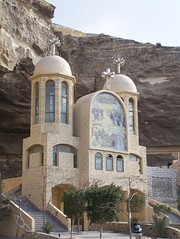King Herod heard of it, for Jesus’ name had become known. Some weresaying, ‘John the baptizer has been raised from the dead; and for this reason these powers are at work in him.’ But others said, ‘It is Elijah.’ And others said, ‘It is a prophet, like one of the prophets of old.’ But when Herod heard of it, he said, ‘John, whom I beheaded, has been raised.’
For Herod himself had sent men who arrested John, bound him, and put him in prison on account of Herodias, his brother Philip’s wife, because Herod had married her. For John had been telling Herod, ‘It is not lawful for you to have your brother’s wife.’ And Herodias had a grudge against him, and wanted to kill him. But she could not, for Herod feared John, knowing that he was a righteous and holy man, and he protected him. When he heard him, he was greatly perplexed; and yet he liked to listen to him. But an opportunity came when Herod on his birthday gave a banquet for his courtiers and officers and for the leaders of Galilee.When his daughter Herodias came in and danced, she pleased Herod and his guests; and the king said to the girl, ‘Ask me for whatever you wish, and I will give it.’ And he solemnly swore to her, ‘Whatever you ask me, I will give you, even half of my kingdom.’ She went out and said to her mother, ‘What should I ask for?’ She replied, ‘The head of John the baptizer.’ Immediately she rushed back to the king and requested, ‘I want you to give me at once the head of John the Baptist on a platter.’The king was deeply grieved; yet out of regard for his oaths and for the guests, he did not want to refuse her. Immediately the king sent a soldier of the guard with orders to bring John’s head. He went and beheaded him in the prison, brought his head on a platter, and gave it to the girl. Then the girl gave it to her mother. When his disciples heard about it, they came and took his body, and laid it in a tomb. – Mark 6:14-29
Dear friends in Christ, grace, mercy, and peace to you from God our Creator and from our Lord Jesus Christ. Amen.
Some days are just jaw-dropping, earth-shaking shockers. Pure disasters. There are some days that, no matter how you shake it, it’s just a bombshell. The morning of September 11th is one of those days. Anyone who watched the news that morning, and in the days to follow, was simply stunned. September 11th, 2001 is one of those days.
November 22, 1963 in Dallas, Texas. A presidential motorcade was making its way through Dallas, shots were fired, and an American president was dead. A nation was completely numbed. That day was, without a doubt, a disaster.
Somewhere around 29 C.E. in Galilee was another one of these days. John the Baptist was one of the only authentic prophet of God in Israel for around 400 years. Crowds came in from all around to the Jordan River to hear John preach. People revered him. It was an honor to hear his words. But one day, John got caught up in a power struggle between Herod Antipas, who was the ruler of Palestine at the time. And his brother Herod Philip. This can get pretty confusing. You see, Herod was a family name. So when we say Herod, we’re actually talking about a whole group of people. So Antipas was the ruler of Palestine at this time in Mark. On his way to Rome, in 29 C.E., he visited his brother Philip and almost immediately falls in love with Philip’s wife, Herodias – who also happened to be Antipas’ niece. Because they are related by blood, Antipas knows that if he marries Herodias, he’ll have a firmer grip on the throne – he’ll have the upper hand in the power struggle between him and his brothers for power in the Roman Empire – anything for a little more power, right?
So Antipas marries Herodias – after he divorces his first wife, Phasaelis mind you. Here’s where John the Baptist comes in. He proclaims that the marriage that had just taken place between Antipas and Herodias was incestuous and wrong. John’s criticism, since he was so well-liked and revered in this area, was a political liability. These words and charges were dangerous to both Antipas and Herodias. Antipas feared John because he was a threat to the power structures, but also, as it turns out, Antipas thinks of him as holy and righteous. It turns out, he actually might like listening to John as well.
 Herodias, however, is having none of it. She doesn’t like John. She doesn’t fear John. John pisses her off. Any chance for Herodias to express her displeasure and act on it arises when Antipas throws a banquet for many of the local leaders. Herodias’ daughter (also named Herodias – like I said, it gets confusing) dances for the men in the room and completely entrances her stepfather. Antipas, caught up in a moment of drunken excitement promises to give her anything she wants, up to half of his kingdom. When Herodias’ daughter comes to her and asks for her advice in this situation, Herodias strikes. “Ask for John’s head on a platter.”
Herodias, however, is having none of it. She doesn’t like John. She doesn’t fear John. John pisses her off. Any chance for Herodias to express her displeasure and act on it arises when Antipas throws a banquet for many of the local leaders. Herodias’ daughter (also named Herodias – like I said, it gets confusing) dances for the men in the room and completely entrances her stepfather. Antipas, caught up in a moment of drunken excitement promises to give her anything she wants, up to half of his kingdom. When Herodias’ daughter comes to her and asks for her advice in this situation, Herodias strikes. “Ask for John’s head on a platter.”
Now you have to remember the scene here. Herod is in the company of prominent locals and VIPs of the community, and certainly can’t go back on something he promised his stepdaughter after she had just wowed all of them with her dancing. He can’t be made to look weak or timid. He can’t look anything other than completely in control of the situation. So he consents. And we know what happens after that.
It can be tempting to look for the “moral of the story” in our Bible passages, but it rarely satisfies what we’re looking for. The Bible wasn’t written as a behavior manual for little children, or as a way to help you make everyday a Friday. It’s a book that, if nothing else, tells us the truth about ourselves and about the world we live in. It tells us about our humanity in all of its bruises and flaws. It tells us the truth of our brokenness, shame, and sin. But it also tells us the greater truth that God’s love breaks through our sin to redeem us and save us, even if it’s from ourselves.
If you really want to find a moral in this story, it’s probably something like this:
The people who are in power are used to getting exactly what they want. They are willing to do anything to hold tight to what they have or to get more. And those who speak out or stand up against them proclaiming that life doesn’t have to be that way or that things can be different are usually trampled.
That’s what happens to John. And as we continue through Mark’s gospel, we’ll see that when Jesus clashes with authority, authority wins – for a short time.
This isn’t much of a moral. It’s pretty depressing. It doesn’t offer us a lot of hope. But what gives us hope is that this is only the 6th chapter of Mark. This is the middle of the story, not the end. But what this story does is points us to the end of Mark’s story, where another truth-teller is silenced by the authority of the day.
When Pilate sends Jesus to Herod, you can almost hear echoes of Herod’s experience with John the Baptist – “I don’t want any part of this.” He knows what’s involved with attempting to silence truth tellers. Authority wins for the time being, but it falls short in the end.
Martin Luther King once said,
“The arc of the moral universe is long, but it bends toward justice.”
 He’s another story of what happens when power silences truth-tellers. This story of Herod and John sits in the middle of Mark’s arc. But it’s not the end. It bends back toward the story of Jesus on the cross and the ultimate shock and awe of the empty tomb.
He’s another story of what happens when power silences truth-tellers. This story of Herod and John sits in the middle of Mark’s arc. But it’s not the end. It bends back toward the story of Jesus on the cross and the ultimate shock and awe of the empty tomb.
Like this story, we’re currently living in the middle – the time in between. In a lot of our lives, power still trumps justice. In two days, Pastor Megan and I are taking 8 of our youth down to New Orleans for the ELCA Youth Gathering. We could probably ask some of the people we meet down there about what happens when power trumps justice.
Martin Luther writes that a theologian of glory calls good evil, and evil good. But a theologian of the cross calls a thing what it is. The beheading of John the Baptist invites us into our call to be honest – to call a thing what it is. It invites us into our call to speak the truth. Even when that truth can be hazardous to our health. Amen.
Cheers,
Eric




















